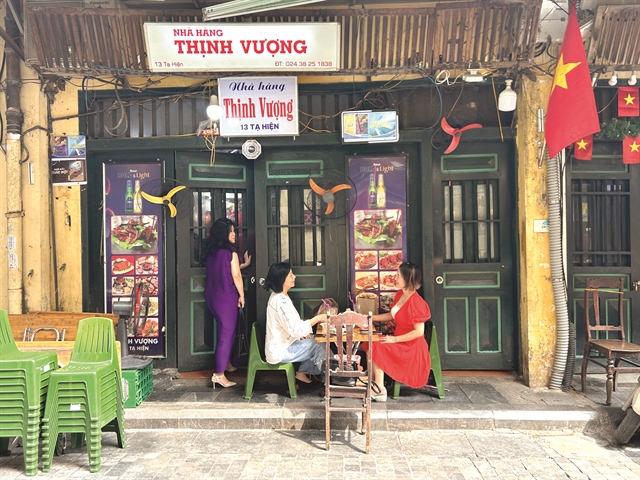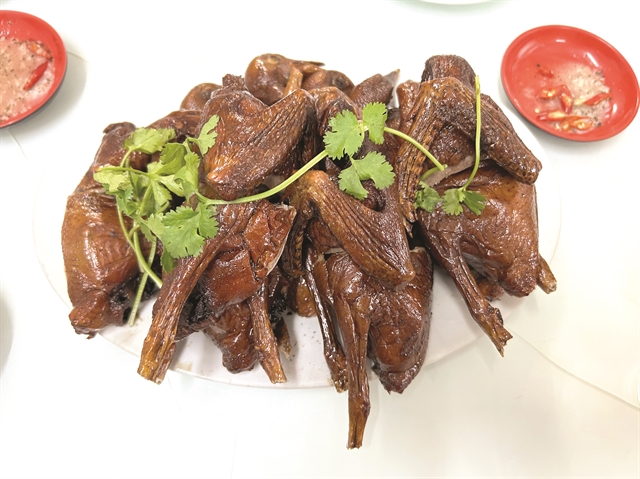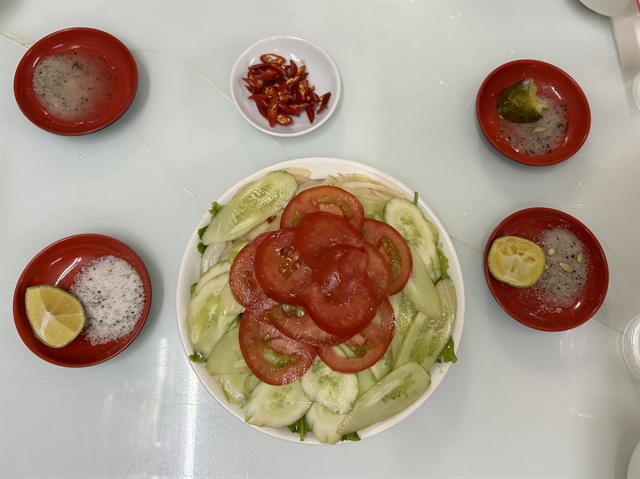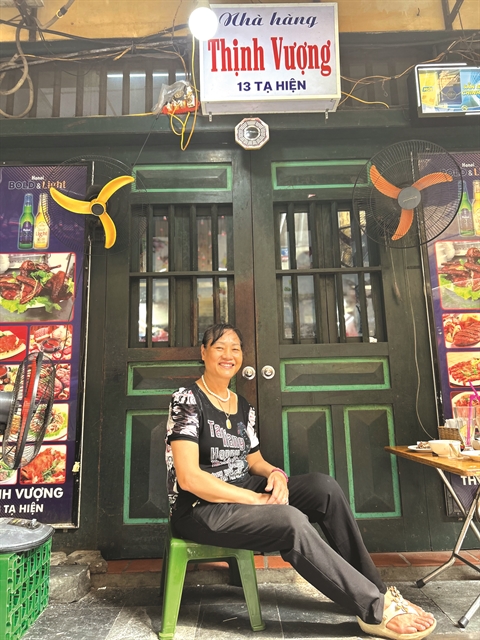 Restaurant Review
Restaurant Review

 |
| END OF AN ERA: The last meals at Thịnh Vượng (Prosperity) restaurant were full; the owners asked clients not to come without bookings, as they wouldn't be able to serve them. VNS Photos Mỹ Hà |
by Nguyễn Mỹ Hà
The only restaurant in Hà Nội's Old Quarter that served signature roasted pigeons will soon be no more – at least not in the way we once knew it.
From October 15, Thịnh Vượng restaurant will operate solely online, offering delivery services, but the charm, cosiness, and homely atmosphere of the place will be gone. The property is being sold as part of an inheritance split between seven siblings who co-owned it. The neighbouring restaurant, Trường Thọ, closed its doors six years ago.
We discovered this heartbreaking news while seated in the cramped but cosy restaurant, enjoying freshly roasted pigeons with cucumber salad. A simple notice, printed on white A4 paper, was taped to the wall. It read, “From October 15, 2024, the restaurant shall close. We will continue online with a couple of phone numbers.”
That was it – the end of an era, one that drew us back time and again for family dinners over the past quarter-century.
Back in the early 2000s, roasted pigeons were a delicacy tied to Hà Nội’s pre-revolution petit bourgeoisie. When Việt Nam opened its doors to the world again, long-forgotten customs and culinary traditions started to resurface. During the economic hardships of the 1980s, having chickens was a luxury. Families would only eat chicken on special occasions like New Year or a death anniversary. No one could have dreamt of indulging in roasted pigeons.
 |
| LOCAL CLASSIC: The house's signature dish - roasted pigeons - that left a lingering taste on all diner's palate. |
To have chim quay (honey-roasted pigeons) or gà tần thuốc bắc (chicken stew with medicinal herbs) wasn’t just about food; it signified the lavish lifestyle of Hà Nội’s upper-middle class. This was the crowd that enjoyed city villas, private cooks, and chauffeurs, sending their children to France for education. The men would wear suits, and women in áo dài would still wrap their hair in a cloth. They enjoyed the prosperity of Hà Nội in the 1930s, a time when the city stood shoulder to shoulder with Tokyo, Hong Kong, and Shanghai as a metropolis of the Far East.
In the 2000s, dining out wasn’t just about gathering as a family – it was a chance to reminisce about the lives our grandparents had left behind when they joined the revolution. “We left everything in the city to withdraw to the mountains,” my grandmother used to say.
 |
| The cucumber salad goes well with most of the dishes offered here. |
The restaurant on Tạ Hiện Street may not have had any visible connections to the pre-war affluence of Hà Nội under French rule. It had low ceilings, simple wooden tables and chairs, and service that was loud and curt. But it had the most important thing – unbeatable food. Although roasted pigeons and herbal stews can now be found everywhere in markets and gourmet shops, they never quite taste the same as they did here.
Ms Bùi Vượng's family business has endured for nearly half a century. The restaurant served every imaginable dish: fish, eel, chicken, crabs, and frog legs. But for us, it was always the roasted pigeons (VNĐ150,000), salad, eel soup (VNĐ40,000), and stir-fried phở with beef and vegetables for three (VNĐ230,000). No frills, just the food.
It was also a go-to spot for foreign correspondents in the 1980s. "During electricity cuts, it would get so hot that some clients had to take their shirts off to bear the heat," the sixty-year-old Vượng reminisced.
Như Quỳnh, whose childhood home was nearby, also has fond memories. "We used to come here as a family treat when my dad received royalties for a new song," she shared, remembering her father, a now-deceased children's songwriter.
In 2010, when Tạ Hiện Street underwent a facelift funded by a joint project between the Hà Nội People’s Committee [the city government] and the French province of Toulouse, the shop was updated with a fresh, vintage look. But even then, the food remained the main attraction.
A few years ago, when a friend was going through marital struggles, we brought her here. The cosy atmosphere, the cold weather, and the soft drizzle helped her let go of some of her sadness. It felt like a fresh start.
 |
| FAMILY RUN: Ms Vượng, and her elder brother Thịnh's names, were taken to name the restaurant Thịnh Vượng in 1979. |
Tạ Hiện Street, named after General Tạ Hiện who served under King Tự Đức (1829-1883), carries its own rich history. After King Tự Đức’s death in 1883, Việt Nam was forced into an agreement with the French, marking the start of colonial rule. Gen Hiện, who was Governor of Nam Định at the time, returned his title in protest and organised local resistance efforts.
History repeated itself in 1954 when Gen Tạ Hiện’s grandson, Company Commander Tạ Quốc Luật, captured General Christian de Castries during the battle of Điện Biên Phủ, marking the end of French rule in Việt Nam.
Today, Tạ Hiện Street is the beating heart of the Old Quarter. As we left the restaurant one last time, the street was filled with the sounds of heavy music, international tourists, and the vibrant energy of modern Hà Nội. Many now call it Beer Street or Backpackers Street. Little do they know that the last remnant of its culinary past is about to disappear.
As the final chapter closes on Thịnh Vượng, the faithful diners who cherished their time here will carry the memories of healing and family dinners. A group of five young people sitting next to us ordered 10 roasted pigeons, stir-fried phở, soups, salads, and frog legs.
We left before their meal arrived, taking our memories of the past with us as we stepped into the bustling street.
Thịnh Vượng Online
Delivery only
Tel: 024-3825-1838
Comment: Savoury traditional Vietnamese party food.




